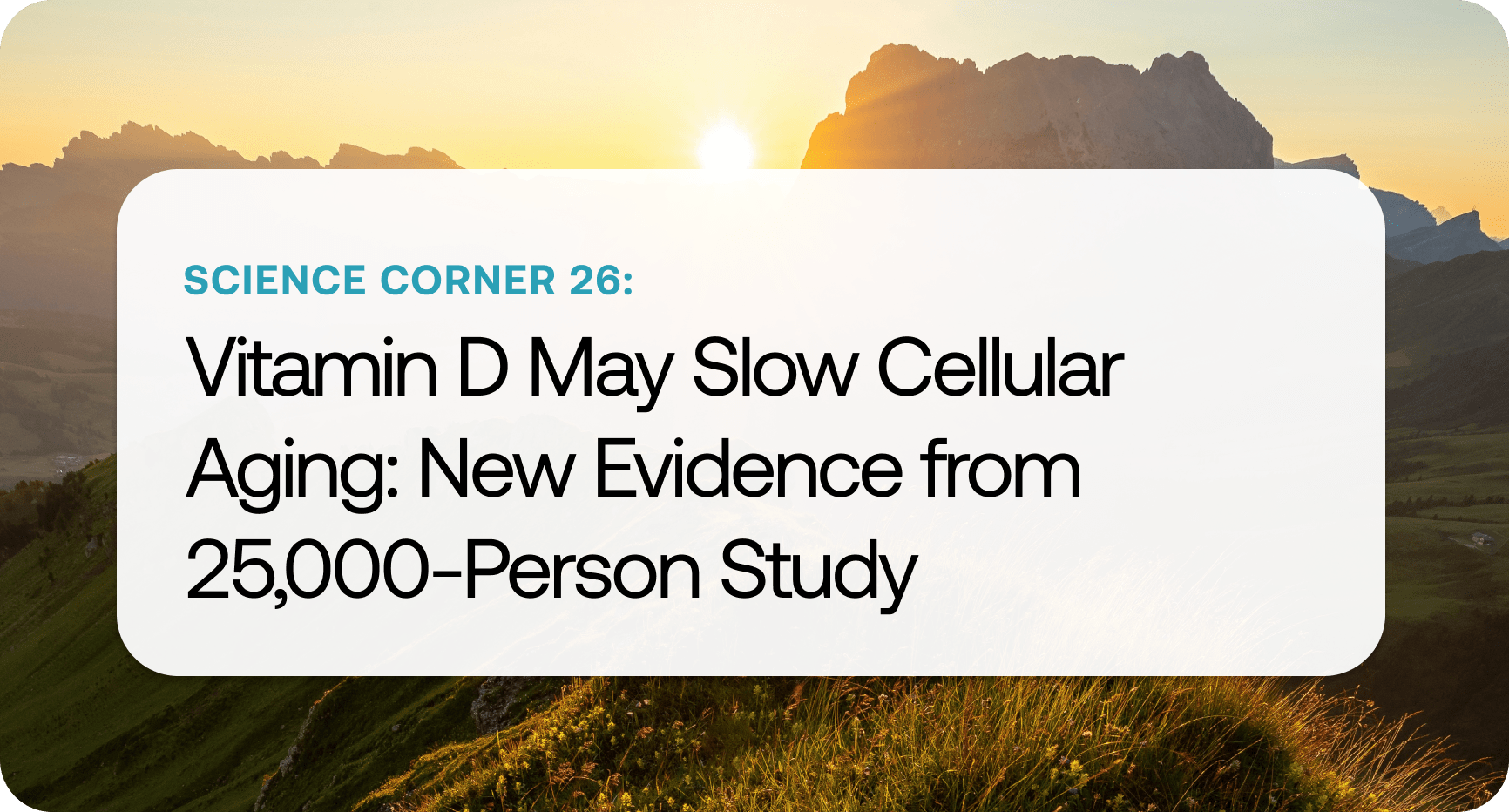Science Corner 26 | Vitamin D May Slow Cellular Aging: New Evidence from 25,000-Person Study

Vitamin D has long been one of the most important and widely used supplements around. It supports bone strength by regulating calcium, it contributes to immune system resilience, and it is being studied for roles in mood and cardiovascular health. At SuppCo, vitamin D stands out as one of our most widely used supplements. It shows up in 46% of all stacks, is included in more than 27,000 products in our database, and features in 38 of our protocols.
Many people think of it as a “winter vitamin,” taking it seasonally when sunlight is scarce, but the evidence suggests we may want to consider it as a year-round foundation for long-term health.
Now, a new research study suggests vitamin D might influence something even more profound: the pace of cellular aging.
The idea that a simple vitamin could slow the aging process sounds like science fiction. Yet, new data from one of the largest supplement trials ever conducted suggests that vitamin D supplementation might do just that. The mechanism at play involves telomeres, the protective caps on our chromosomes that shorten as cells divide and age. When telomeres erode too quickly, the result is cellular senescence, which means cells stop dividing and functioning properly. This build-up of senescent cells is one of the hallmarks of aging and age-related disease.
This finding comes from the VITAL trial, a massive randomized, double-blind, placebo-controlled study that followed over 25,000 U.S. adults for five years. Within that trial, a smaller sub-study focused on telomere length included 1,031 participants who had their telomeres measured at baseline, year two, and year four. Researchers compared groups receiving either vitamin D3 (2,000 IU per day), omega-3 fatty acids, both, or placebo.
Here are the highlights of what they found:
Participants taking vitamin D3 had significantly less telomere attrition compared to placebo
On average, vitamin D slowed shortening by about 140 base pairs over 4 years
Omega-3 fatty acid supplementation showed no significant effect on telomere length
The benefit was consistent over time, suggesting a steady, protective effect on cellular aging
On average, adults lose between 20 and 40 base pairs of telomere length per year as part of normal aging. That might not sound like much, but it adds up over decades. In this context, preserving 140 base pairs over four years with vitamin D is meaningful. It is roughly equivalent to slowing telomere loss by one third to one half compared to what would normally occur. While that does not mean vitamin D will stop aging, it does suggest that consistent supplementation can create a measurable buffer against one of the cellular markers of aging.
However, it is important to balance the excitement with caution. This was a well-designed study, but it measured a biomarker, not clinical outcomes like reduced disease risk or increased lifespan. Telomere length is a proxy for aging, not the whole story. Aging is influenced by many factors, including genetics, lifestyle, and environment. Vitamin D is not a silver bullet, but rather one piece in the larger puzzle of healthy longevity.
Still, the implications are noteworthy. Daily supplementation with 2,000 IU of vitamin D3, a dose higher than the standard RDA but well within safe limits, produced measurable changes at the cellular level in a large, diverse population. That makes this one of the strongest pieces of evidence to date that vitamin D may have anti-aging potential.
--
Personal note from Jordan
As someone who spent years studying the biology of aging, I find this result particularly compelling. I have always thought of vitamin D as a seasonal supplement, something you reach for when the sun disappears in the winter months. But after reading this study, I see it differently. The data suggest that vitamin D may be shaping our biology year-round, not just patching a seasonal gap. I am not expecting it to stop time, but it feels like the kind of steady, foundational influence that quietly tilts the odds in our favor over decades. For me, this reinforces the case for keeping vitamin D in the daily mix, not just the winter lineup.
Citations from this article
Zhu, Haidong, et al. "Vitamin D3 and Marine Omega-3 Fatty Acids Supplementation and Leukocyte Telomere Length: 4-Year Findings from the VITAL Randomized Controlled Trial." The American Journal of Clinical Nutrition (2025). Link.
Aviv, Abraham. "Telomeres and human aging: facts and fibs." Science of Aging Knowledge Environment 2004.51 (2004). Link.
